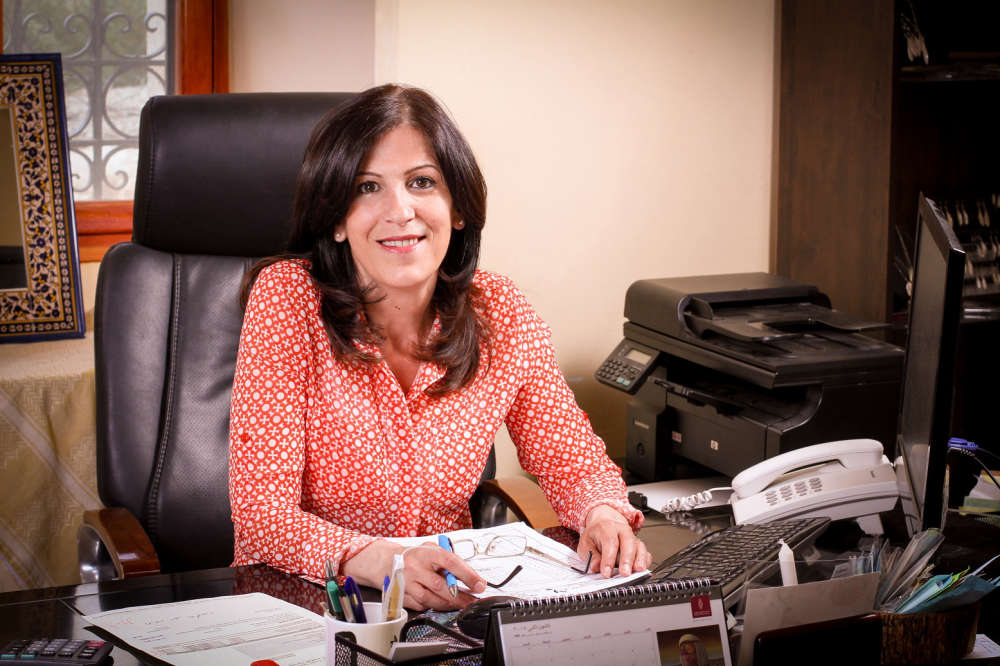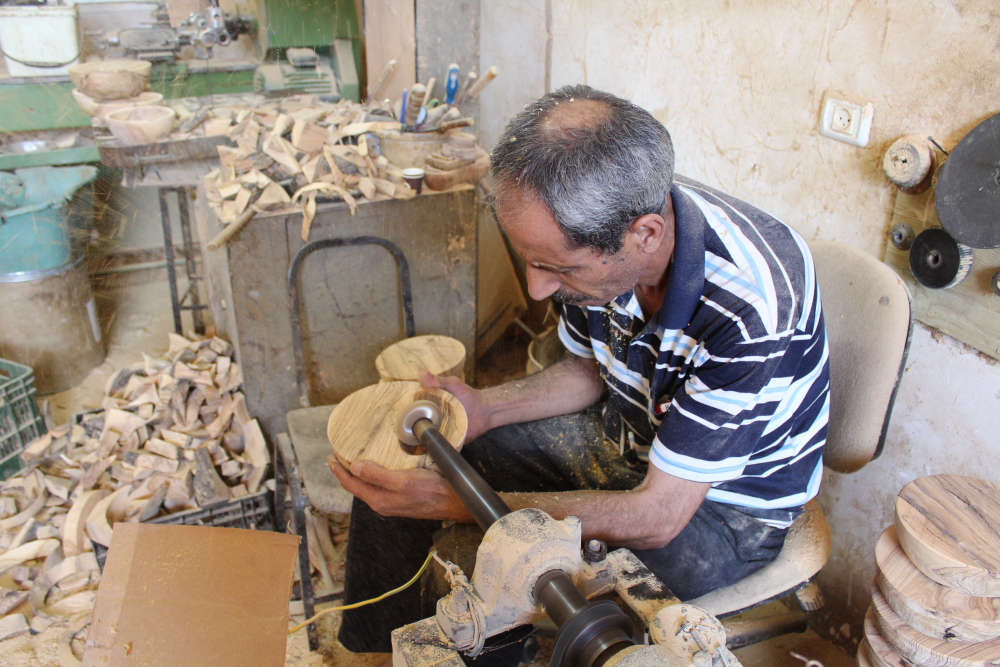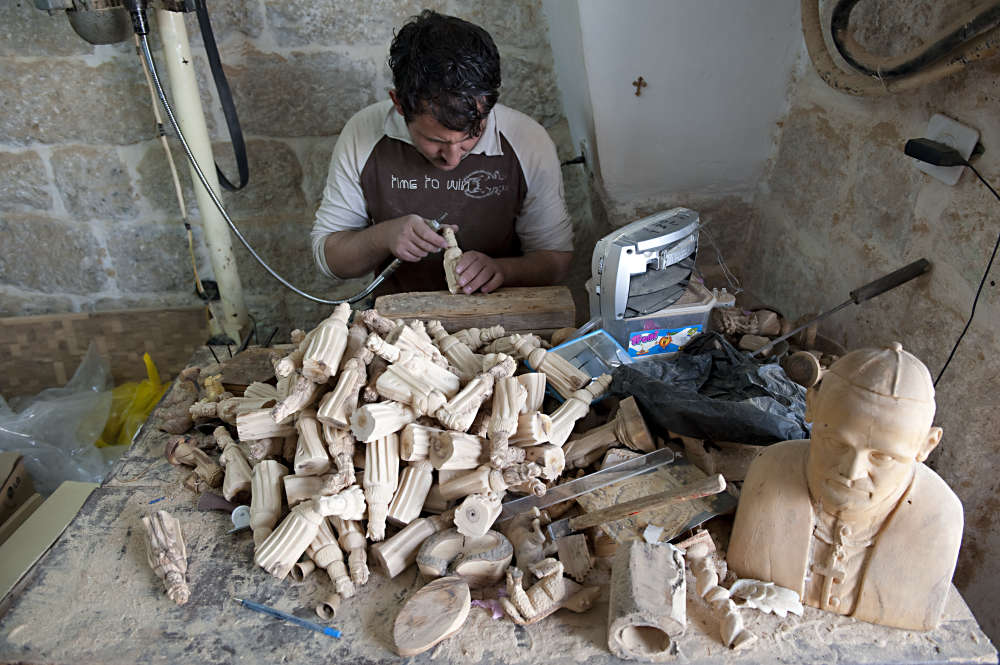Handicrafts have been produced in Palestine for thousands of years as an expression of Palestinian identity and of the people’s connection to their land. Today, they also form a main pillar of the tourism industry. The allure of Palestinian handicraft products lies partly in their historical roots, with expertise that has been passed on through generations, partly in the symbolic connection to the Holy Land in which they are produced. This special quality helps justify the higher price of these artifacts as compared to cheap products that have entered the international market.
Palestinian artisans frequently work in small family-owned workshops that have been operating for many generations. Carvers create wooden items that range from Christmas ornaments, nativity groups, and religious symbols to kitchen and dining ware. Mother-of-pearl workshops create beautiful decorative items, and colorfully painted handmade pottery and tiles have adorned Palestinian homes for centuries. Embroidery gives Palestinian garments a special beauty, and their colors and patterns give testimony to the hometown of the wearer. Pillows, mirrors, and perfume bottles decorated with cross-stitched fabrics, as well as woven fabrics and carpets have decorated homes in villages and towns for uncountable generations. Decorative and daily-use items made of glass in radiant deep hues of blue, green, and purple have been crafted since Roman times. Producing items of such traditional quality and spiritual appeal, the handicraft sector holds important export capacities and potential. And whereas old traditions are being kept alive, modern designs based on transmitted practices are developed continuously, further enriching the sector’s potential.
Many of these crafts were special to particular towns and villages. Woolen fabric woven in Bethlehem by a group of people with disabilities or by Bedouins from all over Palestine was made into tents, rugs, pillows, and other decorative items. Gaza was famous for a silk-like fabric known as gazzatum. Hebron is well-known for its glass production (although there are small workshops also in Jericho, Nablus, and Ramallah), and glass-blowing workshops are a popular tourist attraction. Wood and mother-of-pearl carving has been cultivated in Bethlehem, Beit Jala, and Beit Sahour, and pottery in many shapes has been fired in local charcoal-burning kilns or ovens since prehistoric times, and the art has been carried on in villages such as Sinjil, Al-Jib (Gibeon), and Beitin (Bethel). Soap is still produced from olive oil in Nablus, but the long tradition of making furniture from bamboo is gradually disappearing, as cheaper, mass-produced products are entering the market and providing unsurmountable competition.
The obstacles and challenges that face the handicraft sector are posed by internal policies, inefficient business practices, and Israeli policies.* For example, mass-produced souvenirs sold at cheaper prices are displacing handcrafted Palestinian products that are frequently not sufficiently labeled. Whereas embroidery is a main pillar of the handicraft sector, characterized by a large segment of informal business with women working from home, the potential of this subsector on international markets is limited in part due to the products’ high cost. Wood-carving and other artisans struggle to make ends meet, while souvenir shops buy their products at as little as a tenth of the price they are asking from tourists, a practice that is being fought by advocates for workers’ rights and fair trade.
Small industries in Palestine are most vulnerable, especially during times of crisis and political unrest, as they lack the resources and agency to sustain their livelihood during unstable political circumstances – not to mention that the massive competition of large producers makes it even harder for them to survive. Family-owned businesses are finding it harder and harder to survive. A significant number of handicraft products are exported and sold on foreign markets, but the potential of efficiently exporting products to foreign countries is not fully exploited, and more needs to be done on the legal and administrative levels. Furthermore, the sector needs to improve its marketing and promotional skills, develop strategies to cope with the seasonal nature of tourism-related sales, and find solutions to occupation-related challenges such as obstacles to the import of machinery.
To counter the negative impact of mass production, efforts to secure fair-trade practices are extended all over the world to support individuals and small businesses. In Palestine, one of the few NGOs that work to promote local handicraft in the global economy and facilitate the export of Palestinian handicraft products is Bethlehem Fair Trade Artisans (BFTA). BFTA’s strategy is to provide its producers with more market channels through promotion and advertising; it enables access to international markets in order to make businesses more sustainable. As political uncertainties and the charged political situation make it difficult for producers to sustain themselves from local sales only, and both Palestinian and Israeli export regulations and fees (Israel is in full control of all borders) pose an unsurmountable added cost for individual exporters, 40 percent of the micro and small producers in Bethlehem depend on BFTA to fully sustain their businesses.
Being enabled to enter international markets has significantly improved the work and lives of Palestinian artisans such as George Ghareeb, the Sway brothers, and Nidal Dakkarat.
George Ghareeb from Beit Sahour is a carver of olive-wood ornaments and nativities. Dissatisfied with earning a very low income after working for years at a mother-of-pearl workshop, he opened his own workshop in 1986. George has suffered from health problems in the past and is still in a precarious medical situation. He was diagnosed with throat cancer and had to undergo his operations abroad due to the lack of medical facilities in Palestine and the exorbitant cost of medical care in Israel, as well as not being able to obtain a permit to enter Israel. Having recovered from cancer, George suffered from kidney failure. His brother donated a kidney, but ever since the transplant, George’s overall health status has been unstable. For this reason, he has frequently been unable to attend to his workshop. In addition, following his operation, he was not earning enough income to hire workers for help. His two sons, well-acquainted with their father’s work because they had worked alongside him during summer vacations, decided to step in and fully took over their father’s business after finishing high school. They must help their father support the family, and they are happily doing it. Hand in hand with their mother, they strive to generate income for the household. George can help a little in the workshop, but he is happy to say that his sons are doing an amazing job. Moreover, working with BFTA, they have been able to hire two additional workers, and George is now selling his products worldwide.
Rimon and Nicola Sway from Beit Jala produce kitchen and dining ware from olive wood. Their family-owned business started in 1945, with one man carving olive-wood handicrafts. Since then, three generations have worked in the workshop, and six members are currently working together – still in the original shop. The two brothers Nicola and Rimon each work on unique designs in separate lines of production, but they complement each other’s work. Their main products include olive-wood crosses, kitchenware items, and camels. Like many shop owners in the area, the Sway family has been heavily affected by the political situation. Years ago, the family used to go to Jerusalem to sell their products. After restrictions on movement were put into place following the Intifada, the family can no longer enter Jerusalem, so they must sell their products to local souvenir shops. Because the margin of profit is very low in this setting, the Sway family was happy to engage with BFTA to help market and sell their products globally. As they have been able to introduce their products into the international market, sales of the Sway brothers are increasing just enough to let them create new designs and support their extended families. Rimon, the elder brother, works alongside his handicapped son who loves to spend his time at the workshop where he feels productive and appreciated.
Nidal Dakkarat from Beit Sahour is a carver of crosses made of olive wood with mother-of-pearl accents. Thirty-four years old today, Nidal started his business at the age of 12, after his father had passed away. He knew that he had to take responsibility for helping his family survive. Nidal’s brother travelled to the United States to find a job to support his family. Nidal loved working with olive wood, and he notes: “Looking at my situation and hearing my story, you might think that I was forced into this career. But let me tell you that each time I step into my workshop to create a new design, I feel like an artist given an opportunity to shine.” Nidal taught himself the craft during summer holidays from school. Initially, he worked alongside his mother who dedicated her life to supporting him and the workshop. When Nidal finished high school, financial difficulties did not allow him to gain a college education, but his dedication and love for his work have allowed him to grow his business. He is selling his product online, via BFTA, to customers worldwide and has hired three workers to increase his weekly output. Nidal is proud that every piece that leaves his shop is produced by hand, without the use of copy machines.
*See also: Palestine Chamber of Commerce, “Handicraft Sector, Palestine, December 2013,” available at http://jerusalem.fnst.org/sites/default/files/uploads/2016/09/21/toaccesionimpactonhandcraftssector.pdf.




